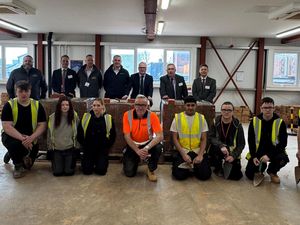Decision on future of cask ale brewing in Wolverhampton is awaited
Real ale campaigners and a business organisation covering Wolverhampton are hoping to hear soon about what the future will be for the historic Park Brewery in Wolverhampton.
The brewery is part of Carlsberg Marston's Brewing Company which was created from the establishment of a joint venture in 2020.
With Marston's having sold its 40 per cent interest to Carlsberg for £206 million and the Danish brewing giant having bought the Britvic soft drinks group for £3.3 billion, the Wolverhampton operation will become part of a new Carlsberg Britvic company.
The business will still be called Carlsberg Marston’s Brewing Company, until completion of the deals. The Marston's deal is conditional on the approval of Marston's shareholders.
Cask ale lovers hope Carlsberg will proves a good custodian of beers like Banks's Original, Marston's Pedigree and Hobgoblin.
CMBC says that a detailed review of the business will be carried out after the deal completes and it will share further plans with its employees and stakeholders "when appropriate".
The Marston's brewing operation also takes in Burton upon Trent in Staffordshire where extra room has been created at the brewery in Shobnall Road with the removal of the traditional Union sets used for brewing Pedigree.
Sian Roberts, sales and marketing director at the Black Country Chamber of Commerce, said: “The name Marston’s has a strong Black Country heritage with the firm having brewed beer in Wolverhampton since 1875.
“The move by Marston’s to leave the brewing industry to focus on running its pubs is a further reflection of how the hospitality sector continues to evolve.
“The Black Country economy is vitalised by the presence of leading brands which the public know and trust, so we look forward to seeing how Carlsberg shape the next chapter in this proud local history of brewing as Marston's focus on their pubs operation from their Wolverhampton HQ.”
Marston's shares rose by as much as 18 per cent on Monday after the announcement but fell back again on Tuesday.
The group, which has its headquarters at St John's House in Wolverhampton will concentrate on running its pubs and no longer have any brewing involvement.
The funds from the sale will help reduce Marston's debts.
It has also been selling non-core pubs and unlicensed sites to reduce the debt level with £50m expected to be generated this year.
The sale to Carlsberg followed changes at the top of the company with Justin Platt replacing Andrw Andrea as chief executive in January and new non-executive chairman Ken Lever announced last week
The future of the 149-year-old Chapel Ash brewery, where Banks's beers are brewed, and neighbouring Marston's House in Wolverhampton will be determined once the deal completes _ expected to be in the third quarter of this year.
The Campaign for Real Ale has said it fears for the future of UK beers, brands and breweries following the announcement.
CAMRA national chairman Nik Antona said: it was a worrying development for Britain’s brewing heritage with Marston’s remaining brewing assets being transferred to a global brewing business which has already presided over the closure of historic breweries like Jennings in Cumbria and Charles Wells Eagle in Bedford, stopped selling cask ale in Scotland and has introduced an extremely damaging ‘fresh ale’ concept which is misleading to pubgoers and threatens the future of British cask conditioned ale.
“The consolidation of the brewing industry into just a few large, international players erodes our brewing heritage, consumer choice, the diversity of beer in pubs across the country and the access to market for small, independent producers.
“Having Marston’s pubs continuing to be subject to an anti-competitive supply tie by Carlsberg Marston’s Brewing Company is also a cause for concern, limiting choice for customers of great locally-produced beer and cider from independent producers nationwide.
“Marston’s and CMBC bosses must commit to the future of brewing cask, improving consumer choice at the bar, protecting Britain’s brewing heritage and scrapping their damaging fresh ale concept once and for all.”





